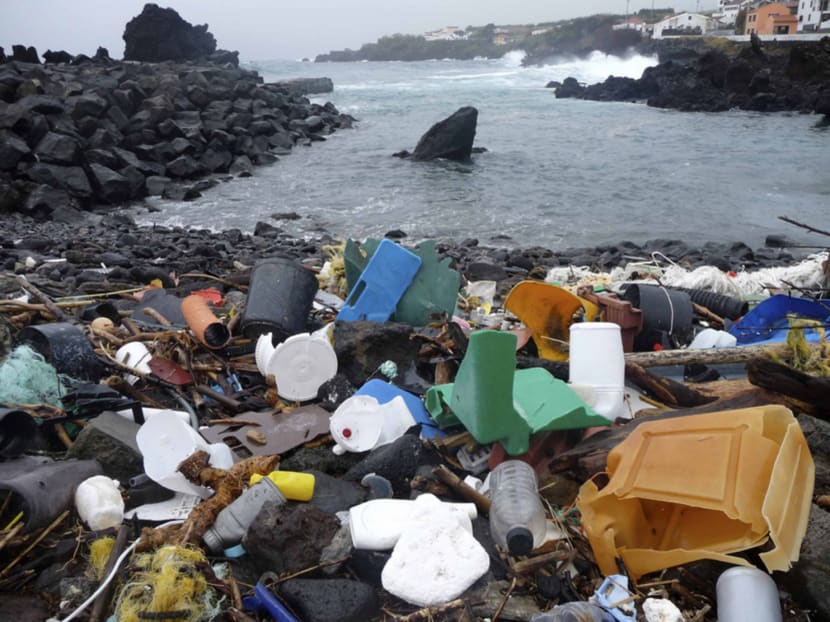269,000 tonnes of plastic litter choke the oceans
WASHINGTON — There are plastic shopping bags, bottles, toys, action figures, bottle caps, pacifiers, tooth brushes, boots, buckets, deodorant roller balls, umbrella handles, fishing gear, toilet seats and so much more. Plastic pollution is pervasive in Earth’s oceans.

Larger plastic objects, abundant near coastlines, often float into the world’s five subtropical gyres. Photo: Reuters
WASHINGTON — There are plastic shopping bags, bottles, toys, action figures, bottle caps, pacifiers, tooth brushes, boots, buckets, deodorant roller balls, umbrella handles, fishing gear, toilet seats and so much more. Plastic pollution is pervasive in Earth’s oceans.
Researchers unveiled on Wednesday what they called the most scientifically rigorous estimate to date of the amount of plastic litter in the oceans — 5.25 trillion pieces of plastic weighing about 269,000 tonnes — based on data from 24 ship expeditions around the globe over six years.
“There’s much more plastic pollution out there than recent estimates suggest,” said Dr Marcus Eriksen, who led the study published in the scientific journal PLOS ONE. The research director for the Los Angeles-based 5 Gyres Institute, a nonprofit group that combines scientific research with anti-pollution activism, said: “It’s everything you can imagine made of plastic ... It’s like Walmart or Target set afloat.”
The ships conducting the research travelled the seas collecting small bits of plastic with nets and estimated worldwide figures from their samples using computer models. The largest source of plastic by weight is from discarded fishing nets and buoys.
Ninety-two per cent of the plastic is in the form of “microplastic” — particles from larger items made brittle by sunlight and pounded to pieces by waves, bitten by sharks and other fish or otherwise torn apart, Dr Eriksen said.
Experts have sounded the alarm in recent years over how plastic pollution is killing huge numbers of seabirds, marine mammals and other creatures while sullying ocean ecosystems. Some plastic objects such as discarded fishing nets kill by entangling dolphins, sea turtles and other animals. Plastic fragments also lodge in the throats and digestive tracts of marine animals.
The researchers said plastic litter enters the oceans from rivers and heavily-populated coastal regions as well as from vessels navigating shipping lanes.
Larger plastic objects, abundant near coastlines, often float into the world’s five subtropical gyres — big regions of spinning currents in the North and South Pacific, North and South Atlantic and Indian Ocean. In the middle of these gyres, plastic trash has accumulated into huge “garbage patches” that act as “giant blenders — shredders that eviscerate plastic from large pieces to microplastics”, Dr Eriksen said. These small bits of plastic then spread far and wide.
Still, when the survey teams looked for plastics floating in the water that were the size of grains of sand, they were surprised to find far fewer samples than expected — one-hundredth as many particles as their models predicted. That, Dr Eriksen said, suggests that the smaller bits may be swept deeper into the sea or consumed by marine organisms.
Noting that the particles readily absorb chemical pollutants, researchers are concerned that fish and other organisms that consume the plastics could reabsorb the toxic substances and pass them along to other predators when they are eaten.
Dr Eriksen said the scope of the problem makes floating garbage collection impractical. His group has had some success with campaigns to get manufacturers of health and beauty aids to stop using small scrubbing beads of plastic in their products. Other manufacturers, he said, must be urged to change their practices as well.
The American Chemistry Council, which speaks for the plastics industries, said in a statement that its members “wholeheartedly agree that littered plastics of any kind do not belong in the marine environment”. AGENCIES





